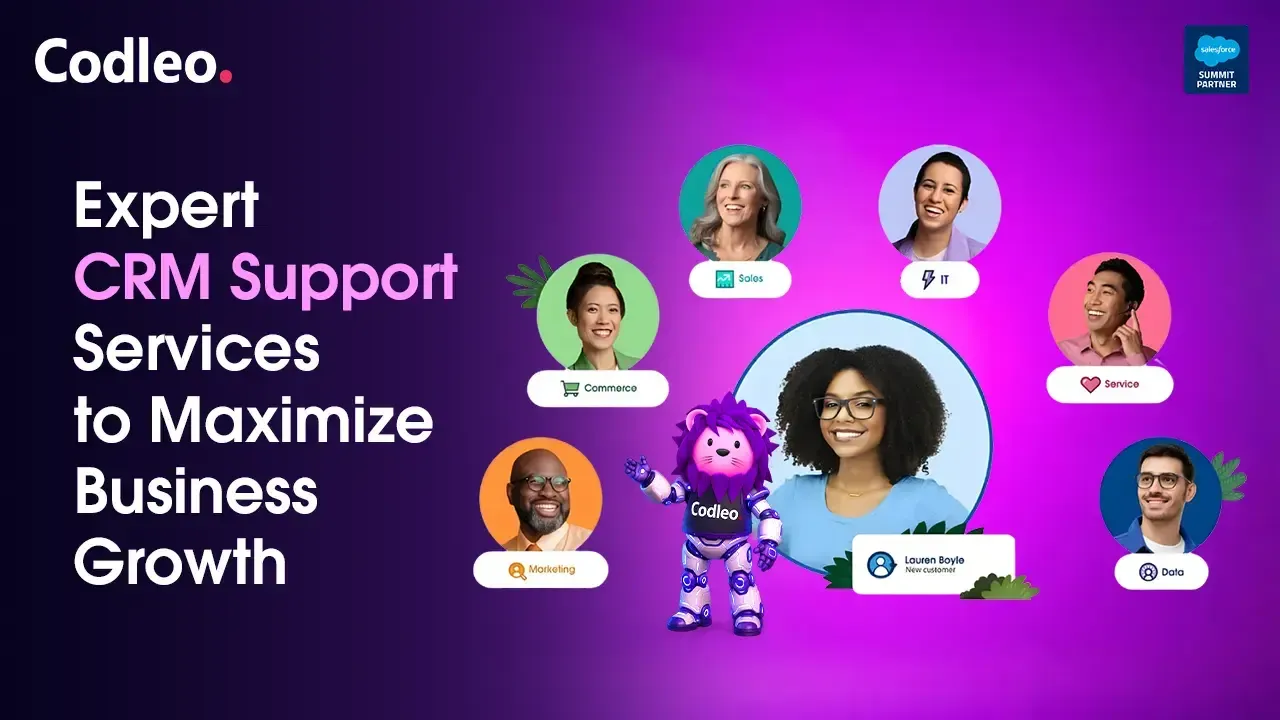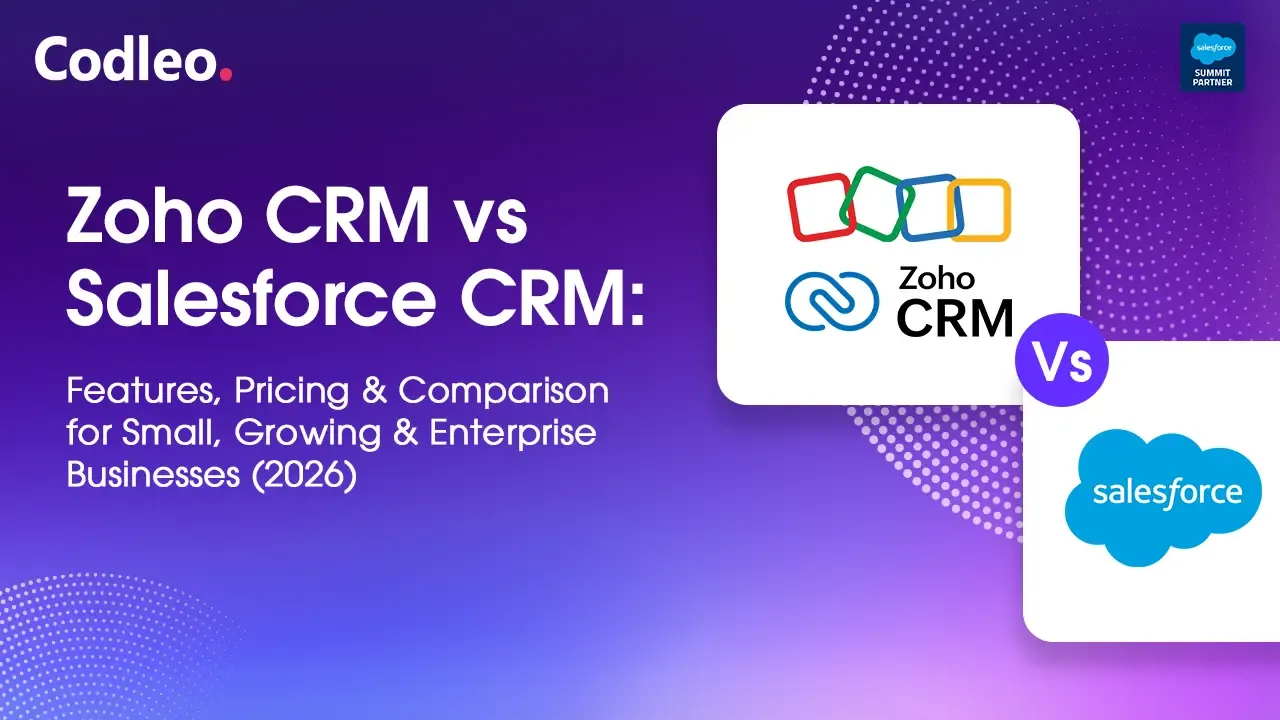Publish date:
Achieving Data Excellence with Salesforce Consulting Services
Maintaining high-quality data is essential for maximizing the benefits of your Salesforce platform. Many organizations, however, face challenges with inaccurate, incomplete, or inconsistent data within their Salesforce instance.
To fully harness the power of Salesforce data, businesses need to embark on a strategic journey where the expertise of skilled Salesforce consultants plays a vital role. These professionals guide organizations in assessing, cleansing, monitoring, and optimizing their Salesforce data, which is crucial for maintaining data integrity.
In this blog post, we’ll share actionable steps to achieve Salesforce data integrity, drawing on best practices and the effective use of built-in Salesforce tools, along with insights from experienced Salesforce partners.
What is Data Quality?
Data quality refers to how well data meets an organization’s standards for accuracy, validity, completeness, and consistency. This concept is fundamental to effective data management, as it ensures that data is reliable and trustworthy for analytics, reporting, and decision-making.
When data quality is poor, it can significantly impact customer service, employee productivity, and strategic initiatives. By monitoring data quality, businesses can identify and resolve issues that threaten data integrity, ensuring that the information is suitable for its intended use.
Why High-Quality Data Matters: A Statistical Overview
Let’s explore the compelling statistics that highlight the importance of high-quality data in today’s business environment.
-
Businesses are estimated to lose around $600 billion each year due to poor data quality.
-
The U.S. economy faces an annual impact of approximately $3.1 trillion as a result of data quality issues.
-
A staggering 94% of organizations believe their customer and prospect data contains inaccuracies, which can lead to negative consequences.
These figures emphasize the critical need for organizations to prioritize high-quality data management to protect their bottom line and enhance overall performance.
The Advantages of High-Quality Data
Poor data quality can have a significant negative impact on an organization’s financial performance. Here are several key reasons why maintaining high-quality data is essential:
-
Personalized Customer Interactions: High-quality data allows businesses to tailor customer experiences. For example, an online shoe store can enhance customer satisfaction by avoiding discounts on items recently purchased. Accurate data enables targeted marketing and personalized offers, which can increase contract renewals and opportunities for upselling.
-
Anticipates Customer Needs: With precise data, businesses can better predict and fulfill customer needs. For instance, an online clothing store can suggest seasonal clothing options that match individual customer preferences.
-
Efficient Issue Resolution: Access to accurate data facilitates quicker resolution of customer issues, leading to improved satisfaction and loyalty.
-
Cost Reduction through Data Quality: Investing in data quality tools not only enhances customer service but also lowers costs. By prioritizing accuracy and consistency, businesses can save time, reduce errors, and minimize risks related to fraud or compliance.
-
Enhanced Decision-Making: High-quality data supports better decision-making. It enables organizations to make timely, informed choices, spot trends, and forecast future outcomes, ultimately guiding effective strategic planning.
Recognizing Signs of Poor Data Quality
In the realm of data management, the adage "garbage in, garbage out" holds—poor input results in poor output. Identifying the signs of data quality issues is essential for any organization. Here are some indicators that suggest poor data quality:
-
Data Entry Errors: Mistakes made during data entry, such as typing errors or inputting the same information multiple times, can significantly disrupt your data integrity. These errors can lead to confusion, wasting both time and resources. Variations in data entry formats, like using "St." instead of "Street," can also create mixed-up records and complicate analysis.
-
Incomplete Information: When data lacks completeness, it becomes unreliable and difficult to use effectively. Missing details can lead to misguided decisions and ineffective strategies.
-
Duplicate Data: Having the same information repeated within your system is a significant issue. It can create confusion and consume unnecessary storage space. Implementing tools to identify and eliminate duplicates is crucial.
-
Outdated Data: Data can become obsolete over time. Changes in personnel or shifts in preferences can render old data irrelevant. Regular updates are vital to ensure your data remains current and useful.
-
Insufficient Data Governance: A lack of data governance can lead to unclear accountability regarding data management. This results in inconsistent practices and varying data quality across teams.
-
Inconsistent Data Classification: Different classifications within your Salesforce CRM, such as "corporate clients" versus "business customers," can complicate data analysis and hinder meaningful insights. Inconsistent labeling makes it difficult to group data accurately or extract valuable insights.
Leveraging Salesforce Data Tools to Ensure Data Quality
The Salesforce platform and its ecosystem, including AppExchange, provide a robust set of tools designed to establish and maintain high data quality. These tools cover everything from monitoring and validation to cleansing and duplicate management, ensuring your sales team has access to accurate and complete data.
AppExchange serves as an excellent resource for specialized solutions when standard features do not fulfill specific requirements. By utilizing these tools, businesses can improve data reliability and efficiency, which is essential for informed decision-making and streamlined operations. Here’s how you can leverage Salesforce data tools:
-
Use Duplicate Management for Accurate Data: Reliable data is vital for business success. Salesforce’s Duplicate Management feature helps reduce and prevent duplicate records, fostering trust among your sales team and ensuring compliance with data protection regulations. The tool provides both individual and organizational solutions for managing duplicates and includes progress-tracking features.
-
Enhance Data with Third-Party Integrations: Integrating external data sources can empower your sales team. Salesforce's Lightning Data and Data.com offer access to extensive firmographic, industry, and regional information. Lightning Data packages are licensed directly from providers, while Data.com provides a unified interface for integrating this third-party data into Salesforce, enriching your customer and prospect records.
-
Improve Data Cleansing and Validation Through AppExchange: While Salesforce validation rules can check data formats, they do not guarantee data validity. This is where AppExchange comes into play, offering partner products for advanced validation, including address, email, and bank verifications. These apps, which can be installed within your organization, enable cloud-based data lookups and bulk verification, especially useful during the data cleansing process.
-
Create Reports and Monitor Data Health with Dashboards: Salesforce provides Data Quality Analysis Dashboards, which feature preconfigured dashboards that use custom fields on standard objects to assess data quality and record completeness. These dashboards are crucial for profiling data, gauging the extent of data quality issues, and continuously monitoring data health.
-
Implement Validation Rules: Salesforce validation rules ensure that data fields contain necessary values, particularly when there are dependencies based on record statuses. You can customize these rules with additional checks, like allowing a custom setting bypass for specific scenarios, such as when conducting mass data loads of clean data.
-
Gain Insights on Data Usage with Salesforce Optimizer: Salesforce Optimizer is a valuable tool for evaluating data completeness and timeliness. Its data list section reveals field usage, helping you identify underutilized or empty fields. This feature supports better decision-making regarding which fields to maintain, modify, or remove for optimized data management.
Best Practices for Enhancing Data Quality in Salesforce
Improving data quality is essential for making informed decisions and ensuring efficient operations. By prioritizing the following strategies, organizations can elevate customer satisfaction, minimize risks, and gain a competitive advantage:
1. Data Cleansing and Deduplication
Data cleansing is crucial for maintaining the integrity and usability of your Salesforce CRM data. This process involves removing duplicates and inaccuracies. Techniques include using algorithms to identify potential duplicates based on names, addresses, emails, and phone numbers. Before beginning this process, establish clear standards for what constitutes accurate, complete, and consistent data.
2. Data Profiling and Auditing Techniques
Regularly auditing your data and implementing automated quality checks are vital steps. Data profiling assesses data quality, completeness, and consistency. Employ techniques like statistical analysis to detect anomalies, pattern recognition to ensure data integrity, and outlier detection to identify potential errors. Tools such as Talend Data Quality, IBM InfoSphere Information Analyzer, and Informatica Data Quality offer comprehensive analysis and auditing capabilities.
3. Data Governance
Data governance is fundamental for maintaining data quality and involves creating frameworks, policies, and procedures for data management. It ensures data integrity, consistency, and compliance with regulations like GDPR and CCPA. Data stewards play a crucial role in overseeing data assets and upholding quality standards. Foster a culture of collaboration among stakeholders, establish cross-functional teams for data management, and promote a sense of responsibility and ownership for data quality.
4. Education and Training
Providing thorough data quality training to data stewards equips them with the skills to effectively manage governance processes. It's also essential to educate regular Salesforce users on best practices for accurate and consistent data entry. Promote organization-wide data literacy and awareness of quality through workshops, discussions, and knowledge-sharing initiatives. These practices enable stakeholders to uphold quality standards, recognize issues, and implement improvements.
5. Master Data Management (MDM)
MDM centralizes the management of critical data entities, ensuring consistency and integrity. It helps eliminate data silos and harmonizes data across systems through effective integration and synchronization mechanisms. MDM's systematic approach includes data profiling, cleansing, standardization, and validation.
6. Data Quality Metrics and Reporting
Tracking data quality metrics such as completeness, accuracy, consistency, and timeliness is vital for guiding decision-making and enhancing operational efficiency. Use advanced tools to monitor these metrics, ensuring data health and enabling proactive improvements. Continuous measurement and improvement are essential for maintaining high standards of data quality.
Role of Salesforce Consultants in Data Quality Enhancement
Salesforce consultants are certified professionals with in-depth knowledge of Salesforce CRM. They play a vital role in understanding a company's unique requirements and guiding them in customizing Salesforce to meet these needs. Their goal is to ensure that Salesforce functions as a tailored solution that aligns with the business's objectives. Here are key ways Salesforce consultants safeguard data quality:
1. Data Assessment and Planning
-
Analyze Existing Data: Consultants thoroughly assess your current data landscape, identifying inconsistencies, redundancies, and gaps.
-
Define Data Quality Goals: They collaborate with stakeholders to establish clear metrics for success, aligning data initiatives with overall business objectives.
-
Develop a Data Governance Strategy: This involves defining data ownership, access controls, and policies to ensure consistent data management.
2. Data Cleansing and Migration
-
Data Cleanup: Consultants employ techniques such as deduplication, standardization, and validation to transform messy data into a clean and coherent form.
-
Data Migration: Whether moving data from legacy systems or within Salesforce, consultants use secure and efficient methods to transfer data safely and accurately.
-
Integrations and Automation: They build seamless integrations with other systems and automate data validation and cleansing processes to minimize manual effort and errors.
3. Data Monitoring and Optimization
-
Real-time Data Quality Monitoring: Consultants leverage tools and dashboards to track data health, proactively identifying and addressing quality issues.
-
Reporting and Analytics: They provide data-driven insights into Salesforce usage and performance, empowering stakeholders to make informed decisions.
-
Continuous Improvement: The data quality enhancement process doesn't stop once initial targets are achieved. Consultants encourage a culture of continuous improvement, regularly reviewing and refining data strategies as needs evolve.
Hiring a Salesforce Consultant
Salesforce consultants act as trusted advisors, working alongside internal teams to implement best practices, foster data awareness, and create a data-driven culture that empowers businesses to reach their full potential. Here’s how to hire a Salesforce consultant for your business:
-
Understand Your Needs: Clearly define your business requirements to find a consultant with relevant expertise.
-
Seek Certified Professionals: Look for Salesforce-certified consultants to ensure validated expertise.
-
Take Your Time: Conduct thorough research to find a consultant who aligns with your specific needs.
-
Focus on Value, Not Cost: Prioritize finding a consultant that offers the best return on investment rather than simply the lowest bid.
-
Industry Experience Matters: Choose a consultant with experience in your sector to ensure tailored solutions that fit your business context.
-
Assess Team Strengths: Consider firms with a diverse team of Salesforce experts to cover various aspects of data management and strategy.
-
Examine Project Management Strategies: Ensure the consultant has a solid project management strategy in place to meet your objectives efficiently.
By following these guidelines, organizations can effectively enhance their data quality and harness the full potential of Salesforce CRM through the expertise of qualified Salesforce consultants.
Conclusion
Data is a keystone for your business success, and its quality can significantly shape outcomes. Low-quality data can lead to inefficiencies, missed opportunities, and potential revenue loss. In the realm of Salesforce, where accuracy is paramount, businesses often encounter challenges in maintaining data integrity.
The comprehensive strategies outlined here provide a robust foundation for enhancing data quality in Salesforce. However, the journey toward achieving data excellence goes beyond merely implementing tools and practices. Salesforce consultants emerge as crucial allies in this quest. Their expertise in data assessment, cleansing, migration, and ongoing optimization adds a layer of precision to your data management efforts. A little support from Salesforce consultants can yield a significant impact on your business growth.
Ready to Elevate Your Data Quality with Expert Salesforce Consultants? Let’s Talk!















